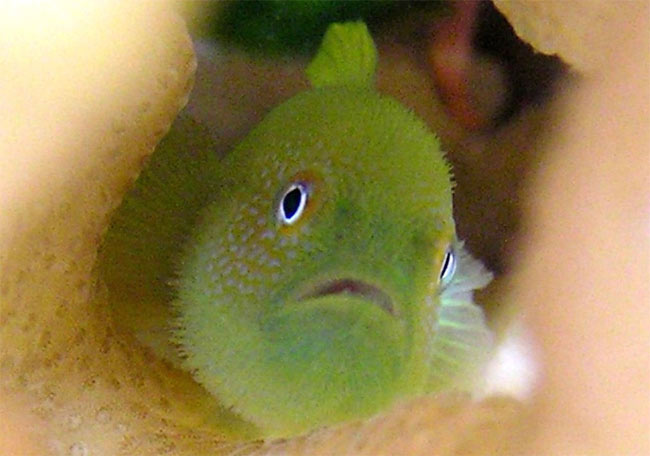Subordinate Fish Starve to Avoid Conflict

Dieting in the fish world can be the ticket to survival. Goby fish starve themselves so they can stay smaller than their superiors and present no threat that could lead to eviction from the group and, likely, death.
A new study reveals how the threat of punishment can keep coral-dwelling goby fish (Paragobiodon xanthosomus) from trying to climb the social ladder and to instead accept, and even work to maintain, their subordinate status. The result is a stable, non-competitive group.
In goby societies, only the top male and top female mate. The other females have to wait in line, the order of which is based on their relative sizes, to achieve alpha breeding status.
“Many animals have social queues in which the smaller members wait their turn before they can mate,” said lead scientist Marian Wong at James Cook University in Australia. “We wanted to find out how they maintain stability in a situation where you’d expect there would be a lot of competition.”
Wong and her colleagues studied a group of goby fish at Lizard Island on Australia’s Great Barrier Reef.
Measurements of the fish showed each fish had a 5-percent size difference from the goby above and below it in the queue. When the size difference varied, say an inferior fish boosted its size, the superior would try to drive the over-eater out of the group.
“Social hierarchies are very stable in these fish and in practice challenges and expulsions are extremely rare,” Wong said, “probably because expulsion from the group and the coral reef it occupies means almost certain death to the loser.”
Get the world’s most fascinating discoveries delivered straight to your inbox.
The discovery, published in the journal Proceedings of the Royal Society B, has implications for the whole animal kingdom, including humans, Wong said.
“It is clear the fish accept the threat of punishment and cooperate as a way of maintaining their social order—and that’s not so very different to how humans and other animals behave,” Wong said.
While maintaining a slim physique might not help humans avoid conflict, certain actions in the workplace could be viewed as parallel to the goby dieters’ behavior. For instance, performing tasks too well could overshadow the boss and just tick him or her off.
“Some employees may face the choice of restraining their own potential goals in order to appease their bosses and so avoid any negative consequences,” Wong said, adding that research would be needed to substantiate this fish-human parallel.
- Images: Freaky Fish
- Mating Game: The Really Wild Kingdom
- Fish Mating Preferences Change With Age
Jeanna Bryner is managing editor of Scientific American. Previously she was editor in chief of Live Science and, prior to that, an editor at Scholastic's Science World magazine. Bryner has an English degree from Salisbury University, a master's degree in biogeochemistry and environmental sciences from the University of Maryland and a graduate science journalism degree from New York University. She has worked as a biologist in Florida, where she monitored wetlands and did field surveys for endangered species, including the gorgeous Florida Scrub Jay. She also received an ocean sciences journalism fellowship from the Woods Hole Oceanographic Institution. She is a firm believer that science is for everyone and that just about everything can be viewed through the lens of science.
 Live Science Plus
Live Science Plus





